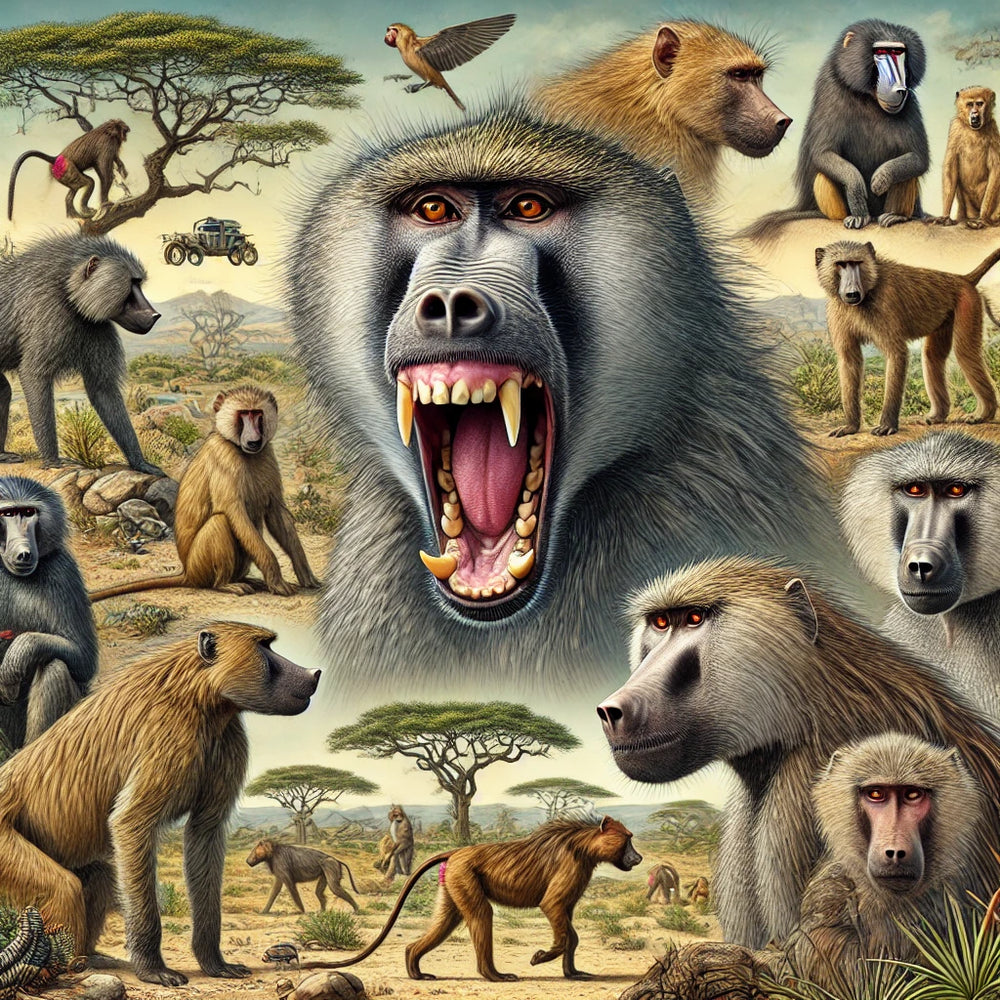Your Cart is Empty
Free US Shipping
Free US Shipping
Baboons are primates consisting of six species including the olive baboon, yellow baboon, Guinea baboon, hamadryas baboon, chacma baboon, and Kinda baboon. They are native to Africa and have existed for two million years. We know they are interesting-looking creatures, but are they dangerous?
Baboons can potentially be very dangerous. Though baboon attacks on humans are rare, nature has generously equipped them with sharp claws and what are known as "dog teeth.” These are very long and pointed eye teeth, also known as "vampire fangs" or cuspids, which can do a lot of damage.
While baboons have largely been indifferent to humans, humans have long been fascinated with baboons, from studies to documentaries to baboon sanctuaries. Ancient humans revered baboons so greatly the Egyptians revered a baboon goddess named Babi, who was the attendant of Thoth. Read on to learn more about baboons. Check out our best gifts for animal lovers.
Baboons are not friendly. Though it isn't typical for baboons to attack humans, they have done so in the past. They also do not get along well with other animals or even other baboons.
Baboons live in groups known as "troops." Each troop can contain up to 50 baboons, is hierarchical, and contains a "harem." That means the group is primarily female with one or two males in dominant mating roles. Troops can even be as large as 250 baboons! That's a lot of danger if you upset just one.
Due to the hierarchical nature of the troop, male baboons will sometimes invade harems to take females. These "raids" break out in baboon "wars," where one small group of males fights to take control of a harem from another group of males. Infant baboons are even taken as hostages or (horrifically enough) used as shields during fights.
When they aren't fighting each other or other animals, baboons are typically relaxed in demeanor, but they are dangerous when they feel threatened and vulnerable. Should they feel threatened, baboons will become aggressive and attack to protect themselves, their young, and their troop.
Baboons arevery dangerous if provoked. Though a full adult baboon is only a fraction of the size of an adult human, that doesn't make them any less dangerous. They have such great strength and can definitely injure someone if they feel threatened.


Baboons’ exceptional strength is a popular topic of discussion.
Among males, the level of strength determines their place in the social hierarchy. For instance, a weak male baboon would receive little food, nor would he be allowed to mate and pass on his genes.
However, compared to other apes, such as gorillas or chimpanzees, baboons are some of the weakest primates. It is probably fair to say that their source of strength rests in their numbers and not their physical abilities.
Aside from strength, teeth, and sharp claws, baboons have an incredible grip, good vision, and an impressive sense of smell. They are also highly intelligent and can adapt to different environments quickly.
Baboons rarely attack humans. In fact, there are only two instances where baboons would be likely to do so. They would be most likely to attack if they felt threatened or provoked. However, they might also attack if the humans had food.
Most primates damage trees by stripping the bark, but baboons also target human crops. Baboons are "opportunistic feeders," which means they will eat whatever they happen across during the day. They will eat lots of things, including:
They’ll even eat baby antelopes if they have the opportunity to do so. Baboons have even been known to eat flamingos, as you can see in the following Youtube video.
Because baboons tend to live near humans, they will raid human crops and tear through dumpster trash, break into vehicles, and (like the grizzly bear) enter people's homes looking for food.
But baboons don't stop at breaking into people's homes. They will also hunt farm animals, including sheep, goats, and chickens. Given how common it is for the little raiders to steal from humans, you might think humans would be attacked by baboons more. But over the years, humans have learned to keep baboons out of their crops and away from their farms, lessening the likelihood of baboon attacks.
Baboons don't steal from humans because they're malicious. Baboons steal from humans because their natural habitats are being taken over by human expansion. The result is that they steal from African farmers, raiding their crops, livestock, and even their garbage.
Sadly, some African farmers have been known to shoot baboons to warn their troops away from their crops. While no one has yet come up with a solution for baboon crop-raiding, there are many humane and non-lethal solutions to keep baboons from raiding your home and garden.
In conclusion, baboons are only dangerous to humans if they are provoked or feel threatened. The way to avoid a baboon attack is to avoid interacting with wild baboons! Keep them off your property and stay out of theirs, and everyone can get along just fine.
